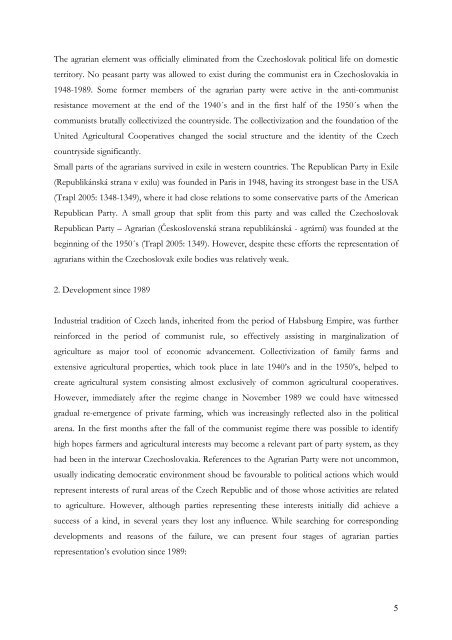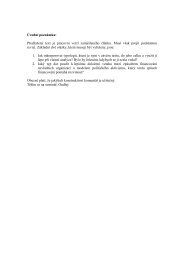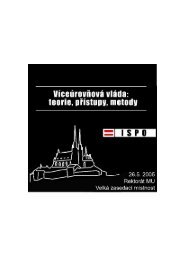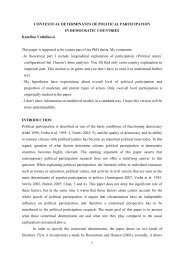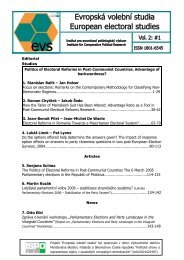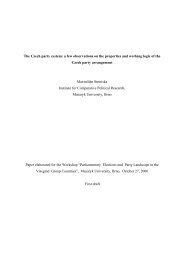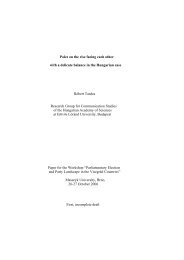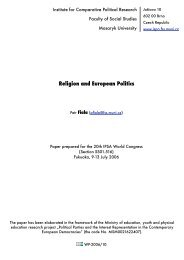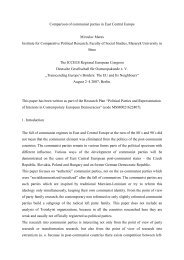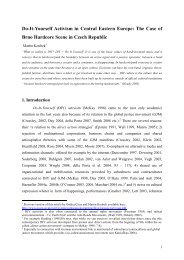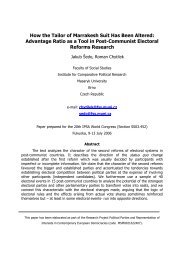Agrarian and Peasant Parties in the Czech Republic - Masarykova ...
Agrarian and Peasant Parties in the Czech Republic - Masarykova ...
Agrarian and Peasant Parties in the Czech Republic - Masarykova ...
You also want an ePaper? Increase the reach of your titles
YUMPU automatically turns print PDFs into web optimized ePapers that Google loves.
The agrarian element was officially elim<strong>in</strong>ated from <strong>the</strong> <strong>Czech</strong>oslovak political life on domestic<br />
territory. No peasant party was allowed to exist dur<strong>in</strong>g <strong>the</strong> communist era <strong>in</strong> <strong>Czech</strong>oslovakia <strong>in</strong><br />
1948-1989. Some former members of <strong>the</strong> agrarian party were active <strong>in</strong> <strong>the</strong> anti-communist<br />
resistance movement at <strong>the</strong> end of <strong>the</strong> 1940´s <strong>and</strong> <strong>in</strong> <strong>the</strong> first half of <strong>the</strong> 1950´s when <strong>the</strong><br />
communists brutally collectivized <strong>the</strong> countryside. The collectivization <strong>and</strong> <strong>the</strong> foundation of <strong>the</strong><br />
United Agricultural Cooperatives changed <strong>the</strong> social structure <strong>and</strong> <strong>the</strong> identity of <strong>the</strong> <strong>Czech</strong><br />
countryside significantly.<br />
Small parts of <strong>the</strong> agrarians survived <strong>in</strong> exile <strong>in</strong> western countries. The <strong>Republic</strong>an Party <strong>in</strong> Exile<br />
(Republikánská strana v exilu) was founded <strong>in</strong> Paris <strong>in</strong> 1948, hav<strong>in</strong>g its strongest base <strong>in</strong> <strong>the</strong> USA<br />
(Trapl 2005: 1348-1349), where it had close relations to some conservative parts of <strong>the</strong> American<br />
<strong>Republic</strong>an Party. A small group that split from this party <strong>and</strong> was called <strong>the</strong> <strong>Czech</strong>oslovak<br />
<strong>Republic</strong>an Party – <strong>Agrarian</strong> (#eskoslovenská strana republikánská - agrární) was founded at <strong>the</strong><br />
beg<strong>in</strong>n<strong>in</strong>g of <strong>the</strong> 1950´s (Trapl 2005: 1349). However, despite <strong>the</strong>se efforts <strong>the</strong> representation of<br />
agrarians with<strong>in</strong> <strong>the</strong> <strong>Czech</strong>oslovak exile bodies was relatively weak.<br />
2. Development s<strong>in</strong>ce 1989<br />
Industrial tradition of <strong>Czech</strong> l<strong>and</strong>s, <strong>in</strong>herited from <strong>the</strong> period of Habsburg Empire, was fur<strong>the</strong>r<br />
re<strong>in</strong>forced <strong>in</strong> <strong>the</strong> period of communist rule, so effectively assist<strong>in</strong>g <strong>in</strong> marg<strong>in</strong>alization of<br />
agriculture as major tool of economic advancement. Collectivization of family farms <strong>and</strong><br />
extensive agricultural properties, which took place <strong>in</strong> late 1940’s <strong>and</strong> <strong>in</strong> <strong>the</strong> 1950’s, helped to<br />
create agricultural system consist<strong>in</strong>g almost exclusively of common agricultural cooperatives.<br />
However, immediately after <strong>the</strong> regime change <strong>in</strong> November 1989 we could have witnessed<br />
gradual re-emergence of private farm<strong>in</strong>g, which was <strong>in</strong>creas<strong>in</strong>gly reflected also <strong>in</strong> <strong>the</strong> political<br />
arena. In <strong>the</strong> first months after <strong>the</strong> fall of <strong>the</strong> communist regime <strong>the</strong>re was possible to identify<br />
high hopes farmers <strong>and</strong> agricultural <strong>in</strong>terests may become a relevant part of party system, as <strong>the</strong>y<br />
had been <strong>in</strong> <strong>the</strong> <strong>in</strong>terwar <strong>Czech</strong>oslovakia. References to <strong>the</strong> <strong>Agrarian</strong> Party were not uncommon,<br />
usually <strong>in</strong>dicat<strong>in</strong>g democratic environment shoud be favourable to political actions which would<br />
represent <strong>in</strong>terests of rural areas of <strong>the</strong> <strong>Czech</strong> <strong>Republic</strong> <strong>and</strong> of those whose activities are related<br />
to agriculture. However, although parties represent<strong>in</strong>g <strong>the</strong>se <strong>in</strong>terests <strong>in</strong>itially did achieve a<br />
success of a k<strong>in</strong>d, <strong>in</strong> several years <strong>the</strong>y lost any <strong>in</strong>fluence. While search<strong>in</strong>g for correspond<strong>in</strong>g<br />
developments <strong>and</strong> reasons of <strong>the</strong> failure, we can present four stages of agrarian parties<br />
representation’s evolution s<strong>in</strong>ce 1989:<br />
5


